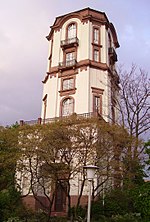Heidelberg University School of Medicine
The Heidelberg University School of Medicine (also known as the Medical Faculty of Heidelberg, German: Medizinische Fakultät Heidelberg) is one of twelve schools at Heidelberg University. It was one of the four original faculties of the university in 1386. Today, it encompasses 22 institutes and maintains a close relationship to the University Hospital Heidelberg. Its medical degree program comprises two years of basic science, followed by the first of three steps of the German medical licensing examination, and four years of clinical studies. From 2001 on, all medical students at Heidelberg University, University Hospital Heidelberg (as opposed to the Heidelberg University Faculty of Medicine in Mannheim) pursue a reformed, six-year-long course called "HeiCuMed" ("Heidelberger Curriculum Medicinale"). This degree course is an adapted version of the Harvard Medical School curriculum. Undergraduate, graduate, and postgraduate programs of Heidelberg University Medical School have played a fundamental role in Heidelberg being awarded "University of Excellence" status by the German Universities Excellence Initiative.
Excerpt from the Wikipedia article Heidelberg University School of Medicine (License: CC BY-SA 3.0, Authors).Heidelberg University School of Medicine
Werftstraße, Mannheim Jungbusch (Innenstadt/Jungbusch)
Geographical coordinates (GPS) Address Nearby Places Show on map
Geographical coordinates (GPS)
| Latitude | Longitude |
|---|---|
| N 49.4957761 ° | E 8.4590301 ° |
Address
Jungbuschschule
Werftstraße 6
68159 Mannheim, Jungbusch (Innenstadt/Jungbusch)
Baden-Württemberg, Germany
Open on Google Maps









